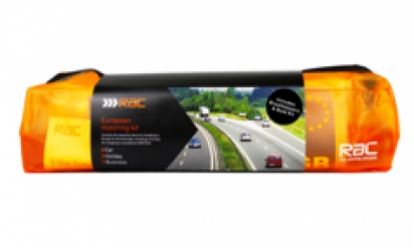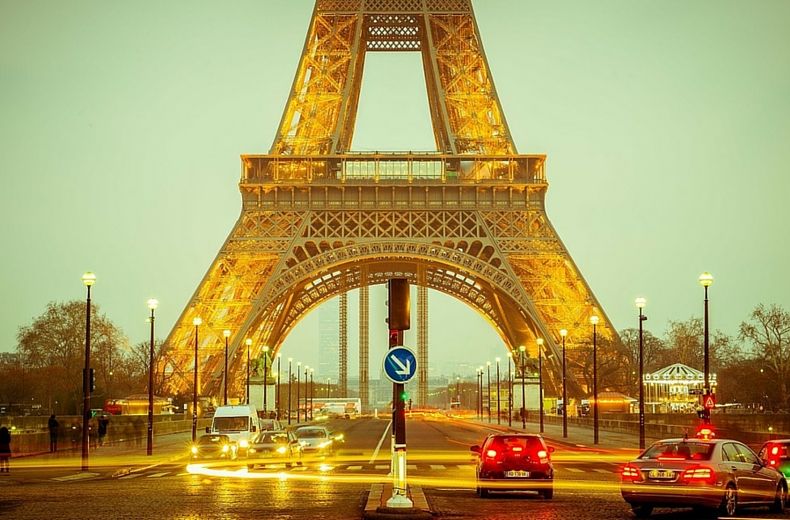But with differing traffic laws across the Channel, it's important to know the regulations and what you need to legally carry for a safe jaunt to France, whether it's a one-time journey or you travel to the region regularly.
Our top 16 tips for driving in France
For a more extensive guide to what documents you need, updated rules of the road, traffic news and embassy information visit our full driving in France advice page.
Remember those of you driving through larger cities will need to purchase a French clean air sticker as they are now mandatory in certain areas. If you do not have one you may receive a fine or not be able to enter certain cities at certain times.
These clean air stickers, known as Crit'air stickers, denote the level of emissions your vehicle produces, and is based on your car's Euro emissions rating.
There's a chance if you drive a slightly older car, it might not be allowed in to certain cities at certain times based on air quality levels on that day.
1. High visibility vest(s)
A high visibility vest (one per passenger) must be carried inside the passenger compartment of your vehicle in case of a car breakdown.
Don’t dismiss this as a silly rule – the French police will stop British-registered vehicles to check they have the correct equipment for driving in France.
If you breakdown on the motorway or need to repair a puncture, make sure you wear it as soon as you step out of the vehicle or you could risk a hefty fine.
2. Warning triangle
Along with a high-vis vest for all of the car’s occupants, a warning triangle is a legal requirement in France.
Most modern cars now come with one fitted as standard, but don’t rely upon the manufacturer giving you one.
Always check if there’s one present in your car before you leave – it is an excellent way of warning traffic of your stranded vehicle ahead should you experience difficulty which will go along way to keeping you safe.
It is advised that the triangle be placed up to 50 metres away from the vehicle, upstream of traffic.
3. Spare bulbs
You are not legally required to carry a spare bulb kit for your vehicle when driving in France, but you may be laible for a fine should you have a failure.
While most motorists in the UK would get a broken bulb fixed as soon as possible, the French police deem it necessary to replace it there and then on the grounds of safety.
Buying a kit could avoid unwanted attention and a fine.
4. Headlight beam adjusters
Modern car’s headlights are set up to point towards the nearside – or kerbside – of the vehicle.
A right-hand drive car on the right-hand side of the carriage way means this could blind oncoming traffic at night.
Either adjust the angle of your headlights, or fit headlight beam adjusters to compensate and help improve safety by increasing visibility on the nearside.
It is mandatory that UK cars driving in France now have headlamp beam converters to avoid dazzling other road users.
5. Breathalyser kit
In years gone by, drivers and motorcyclists had to carry a personal breathalyser kit with at least two disposable testing units. However, in 2020 the rule changed to no longer make it a legal requirement.
It is important to keep in mind that although the law may have changed, the alcohol limit is lower than it is in England - so keeping one of these useful kits in your car is a good idea.
Many of the above items can be purchased in a European Driving Kit.

Instant cover available
• 24/7 rescue at the roadside
• Help to get home if your vehicle can't be fixed
• 5 star Defaqto rated cover

6. Lower drink-drive limit
Following on from this, beware of the lower blood-alcohol limit in France.
In England, Wales and Northern Ireland the blood-alcohol limit is 80mg per 100ml of blood, however, in France it is 50mg per 100ml of blood (the same as in Scotland).
Also for drivers with less than three years' experience, the alcohol limit has been lowered from 50mg per 100ml to 20mg per 100ml.
Although it’s not an exact science – your affective legal alcohol consumption is nearly halved. Even though you could be bang in the middle of vineyard country, our advice would be to avoid alcohol entirely if you need to drive.
7. Speed limits
Just like the UK, there are set speed limits for rural and urban areas that do not always feature repeated signage.
Be mindful of your surroundings and adjust your driving accordingly.
As a general guideline, built up areas are usually 50kph, but can be reduced to 30kph in residential areas.
Trunk roads are all 80kph (unless otherwise directed), while motorways are 130kph (unless otherwise directed) in the dry and 110kph in the wet.
Find out more about French speed limits.
Driving in France Kit from £25.99
Did you know you could be fined up to €530 for not carrying the right kit with you in France?


8. Child passengers
One to note, children under the age of 10 are not allowed to travel on the front seats of vehicles without using a special child restraint. That's unless there is no rear seat in the vehicle, or the rear seat is already occupied with children under 10, or there are no seat belts.
Babies up to nine months in a rear-facing child seat are an exception to the rule also, but the front passenger airbag must be switched off
IMPORTANT: Temporary car insurance - from one hour to 30 days
9. Radar detectors
Radar detectors used to hunt out mobile speed guns are illegal in France and if you’re caught carrying one – even in the boot – you’ll be met by very strict punishment.
This is one transgression the French police don’t take kindly to and you leave yourself open to a minimum €1,500 fine if you break it.
If you have a sat nav or GPS system, make sure you disable this detector - because if you don't the police can still fine you.
10. Don't wear headphones
All drivers and riders are prohibited from wearing headsets and headphones whilst driving, be it for music purposes or for phone calls. However, this does exclude motorcycle helmets that have integrated systems.
11. If you break down - use the orange boxes
If you do break down, you should use the orange emergency telephones that are situated every 2km along main roads and motorways to call the police or the official breakdown service operating in that area.
Alternatively, if no orange telephone is available, you should call the emergency services by dialling 112.
You will be towed to a safe designated area where, in the case of those with RAC European Breakdown Cover, you can then be met by your chosen breakdown provider.
12. Driving age and what documents you'll need
Unlike the UK, to be legally allowed to drive in France, a person must be 18 years old and have a full licence. If you're on a motorbike or moped up to 125cc, a driver must be over 16 years old.
Due to the recently updated rules from the DVLA, you're no longer required to carry your paper licence on the continent.
However, drivers of all ages will need their passport, along with a copy of their insurance and V5 form.
Since August 2021, you no longer need an insurance green card to drive in France.
13. Get a sticker
The national identifier displayed on a vehicle registered in the UK must be a UK sticker rather than a GB one.
The identifier can be incorporated in vehicle number plates (along with the Union Flag) or as a separate sticker.
Vehicles featuring the letters GB together with the Council of Europe golden stars are no longer valid for driving abroad.
14. Refuelling your vehicle
On your journey, you will need to refuel your vehicle. However, when you get to the pumps, how will you know what one you should use?
Luckily, it's not too tricky. Petrol is known as 'essence', unleaded petrol is 'sans plomb' and diesel is 'gozole' or 'gasoil'.
In France, many fuel stations have automatic pumps that use chip-and-pin.
15. Parking in France
If you're driving into a French town or city, you'll be looking for somewhere to stop. However, parking in France is very different to the UK.
Parking is free on roads with dotted white lines or no markings, but it is often allowed on just one side of the road - and this can alternate each day, week or month.
There are 'Blue Parking Zones', where you will need to get a blue disc for your front window in order to use them. These can be purchased at local shops or newsagents. These zones are marked by rectangular blue signs. Failure to display a disk could result in a fine.
16. Unexpected driving practices
Be mindful of old French driving customs, such as giving way to traffic making its way onto a roundabout.
For the most part, this tradition has died out, but some French motorists still abide by the former law, meaning they’ll dart out onto the middle of a roundabout without warning.
The important thing to remember is to be vigilant and take it steady when driving in Europe.
The traffic laws and conventions are sometimes different to ours here in the UK so heightened concentration and careful planning will go a long way.
Finally, it may sound simple but it often gets overlooked: make sure you drive on the right. That goes for roundabouts too - go anti-clockwise!

Instant cover available
• 24/7 rescue at the roadside
• Help to get home if your vehicle can't be fixed
• 5 Star Defaqto rated cover













